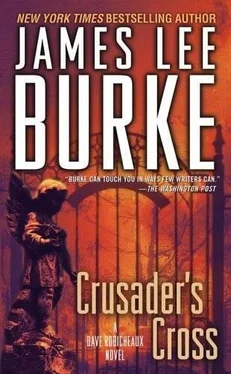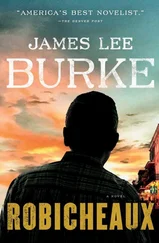It's no accident that both cops and recidivists have mutual understandings about the netherworld they share. The heart-pounding rush, the lack of complexity or societal restraint, the easy access to women who love a gladiator, it all waits for the participant like a glittering avenue in Las Vegas or a free-fire zone inside a green country that has been deemed expendable.
A therapist once told me that the id for some people is a quiet furnace that simply needs a jigger of whiskey as an accelerant.
He also told me I was one of those people.
I went to Clete's cottage, but he was not home. Jimmie was back in town, staying in my spare bedroom, now determined to rebuild the house we had been raised in. He had gone to Lake Charles to contract a builder who specialized in salvaged hardwoods from torn-down barns and farmhouses and what in South Louisiana is called recovered cypress – huge trees that were sunk in swamps or rivers over one hundred years ago, restored into beautiful, soft wood that seems to shine with an interior glow.
I think Jimmie believed he could correct the past and refashion it with nails and ancient wood, somehow cleansing it of bad memories and leaving only the events that should have defined our childhood. I would have given anything that evening if he had been home so I could talk with him. But he was not there, and Val Chalons's words still burned in my ears.
I drove to the graveyard in St. Martinville and under the rising moon said a rosary by Bootsie's tomb. Lightning crawled through the clouds overhead, and across the Teche I could hear music coming from a nightclub and see the neon beer signs in second-floor windows where a party was taking place. I sat for a long time beside Bootsie's tomb, then drove back to New Iberia and went to bed after midnight.
By Friday I was wired to the eyes, trying to find professional reasons which would allow me to confront Valentine for his insults. I told myself I was allowing pride to do the work of my enemies, but my best self-analysis was of no help to me. I didn't care if someone called me white trash or not, but that insult, when it is used in the South, is collective in nature, and Val Chalons had aimed his words at my origins, my mother and father, their illiteracy and poverty and hardship, and I wanted to back him into a corner and break him apart – bone, teeth, and joint.
At noon, I drove out to Molly Boyle's office on the bayou. She was behind her desk, the air-conditioning unit in the window blowing on the side of her face.
"Go to lunch with me," I said.
"Dave -"
"We'll take someone with us."
"You're suggesting we're doing something illicit," she said.
"It's what we did before. Don't shine me on."
She pressed her fingers against her temples. "You roll in here like a hurricane, then accuse me of being disingenuous. It's a bit hard to take."
"So drink a Dr Pepper with me."
"No!"
I was standing in the middle of the room, drowning in my own ineptitude and heavy-handedness.
She put on a pair of reading glasses, then took them off again. "Is this about the man you had to shoot?"
I felt my right hand open and close at my side, a drop of sweat form and run from my armpit. "He wasn't the first," I said.
"Pardon?"
"I've killed others."
"Have you talked to somebody about this?"
"What do you think?"
"I can't have lunch with you," she said.
"Why not?"
She looked straight ahead, out the window, her skin flushed, her eyes filming. Then she propped her forehead on the ends of her fingers so I could not see her face. "I can't be of any help to you. I wish I could. I'm sorry," she said. When she looked at me again, there were tiny red threads in the whites of her eyes.
That evening, after work, I went shopping at the Winn-Dixie. I filled the basket with items I didn't need, and told myself that perhaps I should invite friends over, maybe barbecue in the backyard or cook a huge gumbo for the people Jimmie and I had grown up with. I dropped frozen packs of veined shrimp and crawfish in the basket, along with gourmet cheese and a smoked ham, a chocolate cake, a gallon of ice cream, crackers and cans of smoked oysters, ginger ale, diet drinks, big jars of fruit juice, a case of Corona, a fat green bottle of Burgundy, and a quart of Jim Beam and one of Black Jack Daniel's.
I could hear a whirring sound in my ears, like wind blowing in a conch shell, as I stacked my purchases on the conveyor belt at the checkout stand. Then the black teenage girl working behind the register, whom I had deliberately chosen, went on break, and the assistant manager, a man my age, took her place. "Fixing to have a party at your house, Dave?" he said.
"Yeah, I thought I might," I said.
"Good weather for a cookout, huh?" he said, scanning the beer and whiskey and wine on the belt, his face empty of expression.
"It's supposed to rain, but who knows?" I said.
"Could be. Everyt'ing all right with you, Dave?" he said.
"Just great," I said.
"That's good. That's real good," he said. For the first time, he looked directly at me, his feigned cheerfulness carefully held in place.
I rolled the basket through the parking lot to my truck and began loading my groceries in back, the sky overhead gray and crackling with dry thunder. Then Molly Boyle passed me in a rusted compact, looked back at me, and made a U-turn, almost running over a man on a bicycle. She stopped abreast of me, her windows down, the front windshield spotted with raindrops. "I want to talk to you," she said.
"Go ahead," I replied.
Her eyes lighted on the packages in the bed of my pickup. "Not here. I'll follow you to your house," she said.
"I'm kind of tied up right now," I said.
"No, you're not," she said.
I tried to lose her in the traffic and reach my house with enough time to unload the pickup and put everything away before I had to invite her inside. But Molly Boyle was a determined adversary. She stayed right behind my pickup, all the way down Main, past the antebellum and Victorian homes that lined the street, past the city library and the grotto dedicated to Jesus's mother, right into my porte cochere.
The rain was ticking on the trees and my tin roof as I hefted up two bags of groceries and started in the house, leaving the case of Corona and bottles of Black Jack and Beam and Burgundy in the truck.
She did not wait on an invitation. She picked up an armload of booze and followed me into the kitchen and set it down with a clunk on the drainboard, pushing a strand of hair out of her eye. "You wouldn't want to leave this in the rain, would you?" she said.
"I buy it for guests sometimes," I said.
She raised a finger at me before the words were hardly out of my mouth. "Lie to others or lie to God, and you're only human. Do it to yourself and you never wash out the stain," she said.
"How about taking it out of overdrive?" I said.
"I acted in a cowardly fashion this afternoon," she said.
"I don't under-"
"You were obviously in need of a friend, or you wouldn't have come to my office. I've been a hypocrite, Dave."
"No need for a confession here. Everything is copacetic," I said, my gaze drifting back to the booze on the drainboard.
"I led you on, then I sent you away. Please don't drink. You're a good man. Everyone seems to know that except you."
The light had gone out of the sky, and I could hear hailstones on the roof and see them bouncing in the backyard. Out on the bayou a willow tree turned white when lightning struck in the park. When I looked back at Molly, her face was close to mine, as though it had floated there, out of a dream. I put my mouth to hers, then felt her arms around my neck, her stomach against me. I could feel the smoothness and warmth in her skin and smell a fragrance in her hair, like night-blooming flowers. I squeezed her against me, hard, perhaps harder than I should have, but she had the firm, muscular body of a countrywoman and I realized that Molly Boyle was probably not daunted by anyone or anything.
Читать дальше












